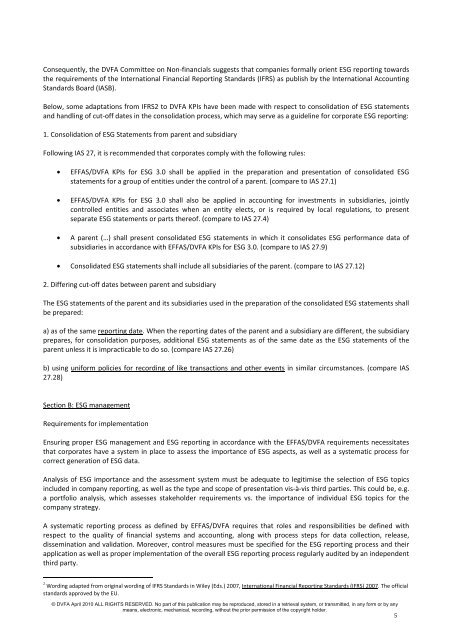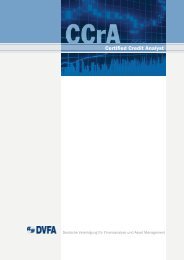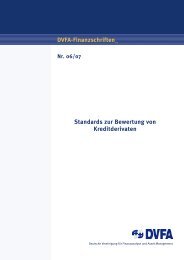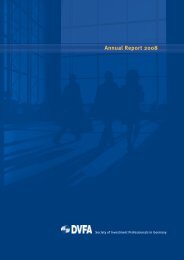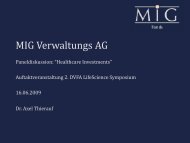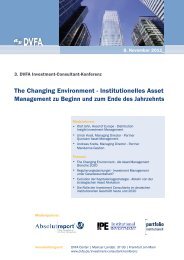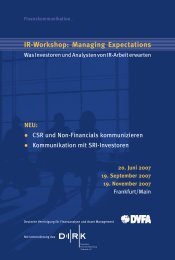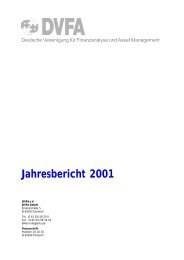KPIs for ESG - DVFA
KPIs for ESG - DVFA
KPIs for ESG - DVFA
Create successful ePaper yourself
Turn your PDF publications into a flip-book with our unique Google optimized e-Paper software.
Consequently, the <strong>DVFA</strong> Committee on Non-financials suggests that companies <strong>for</strong>mally orient <strong>ESG</strong> reporting towards<br />
the requirements of the International Financial Reporting Standards (IFRS) as publish by the International Accounting<br />
Standards Board (IASB).<br />
Below, some adaptations from IFRS2 to <strong>DVFA</strong> <strong>KPIs</strong> have been made with respect to consolidation of <strong>ESG</strong> statements<br />
and handling of cut-off dates in the consolidation process, which may serve as a guideline <strong>for</strong> corporate <strong>ESG</strong> reporting:<br />
1. Consolidation of <strong>ESG</strong> Statements from parent and subsidiary<br />
Following IAS 27, it is recommended that corporates comply with the following rules:<br />
• EFFAS/<strong>DVFA</strong> <strong>KPIs</strong> <strong>for</strong> <strong>ESG</strong> 3.0 shall be applied in the preparation and presentation of consolidated <strong>ESG</strong><br />
statements <strong>for</strong> a group of entities under the control of a parent. (compare to IAS 27.1)<br />
• EFFAS/<strong>DVFA</strong> <strong>KPIs</strong> <strong>for</strong> <strong>ESG</strong> 3.0 shall also be applied in accounting <strong>for</strong> investments in subsidiaries, jointly<br />
controlled entities and associates when an entity elects, or is required by local regulations, to present<br />
separate <strong>ESG</strong> statements or parts thereof. (compare to IAS 27.4)<br />
• A parent (…) shall present consolidated <strong>ESG</strong> statements in which it consolidates <strong>ESG</strong> per<strong>for</strong>mance data of<br />
subsidiaries in accordance with EFFAS/<strong>DVFA</strong> <strong>KPIs</strong> <strong>for</strong> <strong>ESG</strong> 3.0. (compare to IAS 27.9)<br />
• Consolidated <strong>ESG</strong> statements shall include all subsidiaries of the parent. (compare to IAS 27.12)<br />
2. Differing cut-off dates between parent and subsidiary<br />
The <strong>ESG</strong> statements of the parent and its subsidiaries used in the preparation of the consolidated <strong>ESG</strong> statements shall<br />
be prepared:<br />
a) as of the same reporting date. When the reporting dates of the parent and a subsidiary are different, the subsidiary<br />
prepares, <strong>for</strong> consolidation purposes, additional <strong>ESG</strong> statements as of the same date as the <strong>ESG</strong> statements of the<br />
parent unless it is impracticable to do so. (compare IAS 27.26)<br />
b) using uni<strong>for</strong>m policies <strong>for</strong> recording of like transactions and other events in similar circumstances. (compare IAS<br />
27.28)<br />
Section B: <strong>ESG</strong> management<br />
Requirements <strong>for</strong> implementation<br />
Ensuring proper <strong>ESG</strong> management and <strong>ESG</strong> reporting in accordance with the EFFAS/<strong>DVFA</strong> requirements necessitates<br />
that corporates have a system in place to assess the importance of <strong>ESG</strong> aspects, as well as a systematic process <strong>for</strong><br />
correct generation of <strong>ESG</strong> data.<br />
Analysis of <strong>ESG</strong> importance and the assessment system must be adequate to legitimise the selection of <strong>ESG</strong> topics<br />
included in company reporting, as well as the type and scope of presentation vis-à-vis third parties. This could be, e.g.<br />
a portfolio analysis, which assesses stakeholder requirements vs. the importance of individual <strong>ESG</strong> topics <strong>for</strong> the<br />
company strategy.<br />
A systematic reporting process as defined by EFFAS/<strong>DVFA</strong> requires that roles and responsibilities be defined with<br />
respect to the quality of financial systems and accounting, along with process steps <strong>for</strong> data collection, release,<br />
dissemination and validation. Moreover, control measures must be specified <strong>for</strong> the <strong>ESG</strong> reporting process and their<br />
application as well as proper implementation of the overall <strong>ESG</strong> reporting process regularly audited by an independent<br />
third party.<br />
2<br />
Wording adapted from original wording of IFRS Standards in Wiley (Eds.) 2007, International Financial Reporting Standards (IFRS) 2007. The official<br />
standards approved by the EU.<br />
© <strong>DVFA</strong> April 2010 ALL RIGHTS RESERVED. No part of this publication may be reproduced, stored in a retrieval system, or transmitted, in any <strong>for</strong>m or by any<br />
means, electronic, mechanical, recording, without the prior permission of the copyright holder.<br />
5


